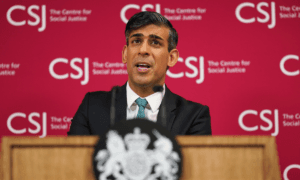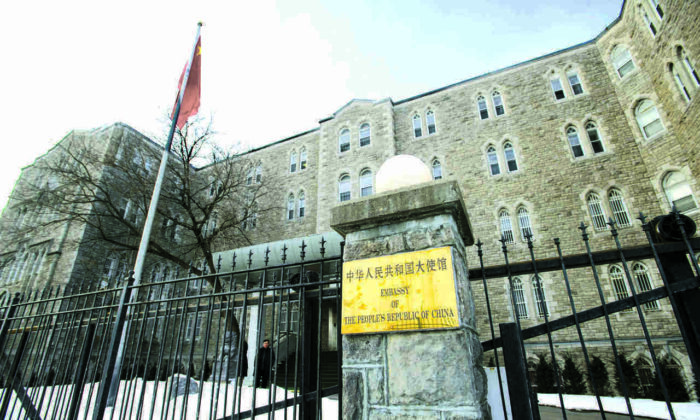Figures obtained by the Liberal Democrats also revealed that six in ten councils have seen a rise in staff who are off on long-term sick leave since 2019.
Almost 10,000 council employees in England are on long-term sick leave, an increase of nearly one-fifth since before the lockdown, according to data obtained by the Liberal Democrats.
Figures obtained via Freedom of Information requests and published by the party on Thursday showed that as of Feb. 12, there were 9,979 council staff on long-term sickness leave, up 18 percent from 8,441 in 2019.
The report found that six in ten (58 percent) of the 185 councils which responded had seen a rise in the number of staff on long-term illness—classed as four or more weeks of absence due to sickness—since before the pandemic.
Liberal Democrat local government spokeswoman Helen Morgan MP said the figures reveal “a long-term sickness epidemic” which is “hitting local councils across the country.”
The data release comes after figures from Office for National Statistics revealed that there were 2.8 million people on long-term sick leave in the UK, a record high.
Only 4 out of 185 Councils Had No Staff on Sick Leave
The FOI data also revealed that more than half of councils—98 out of 185—showed a year-on-year increase in long-term absences when comparing 2023 to 2024.
The local authority with the highest number of staff on sick leave was Birmingham City Council, with 561 employees off, an increase of 44 percent from 390 in 2019. The second-highest was Leeds City Council, which has 425 staff off sick, up by 67 percent from 254 in the year before lockdown.
Only four councils in the country had no staff on long-term sick leave: Copeland, Rushmoor, Staffordshire, and West Oxfordshire District Council.
Ms. Morgan said, “Council staff are working hard every day to deliver for their local communities while facing the stress of government funding cuts and having to operate on a shoestring.”
She continued: “Under the Conservatives, more people are going off with long-term sickness and not getting the support they need. Rishi Sunak is happy to point the finger at staff who are ill while ignoring the serious issues caused by his government’s neglect of the NHS.
“The NHS is as stretched as it’s ever been and this Government is to blame—they’re failing patients and hurting our local services at the same time. Ministers need to tackle waiting lists and give workers across the country the high-quality care they deserve.”
The Epoch Times has approached the Department for Health and Social Care for comment.
‘Sick Note Culture’
Last week, Prime Minister Rishi Sunak announced welfare reforms to end the UK’s “sick note culture.”
In 2023, 94 percent of the 11 million Fit Notes issued were signed off as “not fit for work.”
Mr. Sunak said he would overhaul the way Fit Notes were administered, taking power away from GPs and giving it to specialists who can objectively assess someone’s ability to work and offer them any tailored support they may need.
“We don’t just need to change the sick note—we need to change the sick note culture so the default becomes what work you can do—not what you can’t,” Mr. Sunak had said during a speech delivered last Friday at the Centre for Social Justice think tank.
 File photo of a Job Centre Plus dated Feb. 17, 2016. (Philip Toscano/PA Wire)
File photo of a Job Centre Plus dated Feb. 17, 2016. (Philip Toscano/PA Wire)Other reforms include tightening up assessments for work capacity, meaning that hundreds of thousands of benefit recipients with “less severe conditions” would be expected to go back to work “and be supported to do so.”
There will also be “higher expectations” of those who receive benefits and who can work to put in more hours in employment.
The prime minister said that failure to address the growing number of people who have become economically inactive would not only let down those who need help getting back into work, but create a “deep sense of unfairness amongst those whose taxes fund our social safety net.”
 Prime Minister Rishi Sunak giving a speech on welfare reform in central London on April 19, 2024. (Yui Mok/PA Wire)
Prime Minister Rishi Sunak giving a speech on welfare reform in central London on April 19, 2024. (Yui Mok/PA Wire)Sickness-Related Inactivity ‘Rising Since the Pandemic’
Last month, Work and Pensions Secretary Mel Stride said that mental health culture had gone “too far,” resulting in the normal ups and downs of life being viewed as “medical conditions” that hold people back, and “ultimately, drive up the benefit bill.”
Mr. Stride was criticised for the remarks, including by Dr. Lade Smith, president of the Royal College of Psychiatrists, who said the comments “diminish and misrepresent people with mental illness.”
A Number 10 spokesman said at the time that the prime minister agreed with Mr. Stride on “the challenges that we are facing with tackling long-term sickness-related inactivity in the workforce.”
The spokesman said, “It is clear that long-term sickness-related inactivity and mental health-related inactivity have been rising since the pandemic.”
Last week, the Resolution Foundation warned that Universal Credit, the government’s benefits system, would need to change because it was not designed to support such a high number of people with illnesses or disabilities.














 English (US) ·
English (US) ·  Turkish (TR) ·
Turkish (TR) ·